— This blog post was written by Dr Julie Van Pelt, postdoctoral fellow of the FWO.
An academic job comes with a variety of responsibilities, and the organisation of academic events can be among them. Like most of my colleagues, I do not have any formal training in event coordination, but sooner or later, a researcher’s innate event planning skills will be put to the test – and developed. I have had several opportunities for the development of this ‘transferable skill’ in the past, and last summer a question from a colleague gave me the opportunity to capitalize on this experience. The colleague was Dimitri Van Limbergen, a postdoctoral researcher from my faculty’s Archaeology Department. The question was whether I would be prepared to join him as a fellow organiser of the next U4/ENLIGHT Ancient World Winter School, which would take place (or, at the time of writing this blog, has taken place) between 14 and 18 March 2023, in Rome. You guessed it – I said ‘yes’.[i]
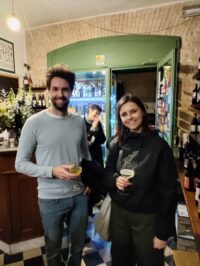
The Ancient World Winter School is a collaborative event between the Classics Departments (or equivalent) of a number of member universities of the ENLIGHT network (formerly of the U4 Network)[ii] that knows quite a history already. For the purposes of this blog post, I looked into that history and learned from a trustworthy source about its consecutive yearly organisation since its first edition in 2010.[iii] Each of the editions thus far organised was attended by delegates from the various departments hosting research on the ancient world at Ghent University.[iv] The goal of the Winter School is, and has always been, to offer beginning PhD students a first conference(-like) experience; to give them an opportunity to present their research in a 20-minute paper and develop their overall conference and presentations skills in a friendly environment. PhD students from any discipline related to the ancient world are welcome. Yet, to enhance the conference-like setting, presenters are invited to choose their topic in line with an overarching theme. This year’s central theme: ‘The old and the new: tradition and innovation in Antiquity’. While the credit for this excellent theme must entirely go to my co-organiser Dimitri, who suggested it, it happened to have a strangely symbolic aptness for me since I myself attended the 2015 edition of the Winter School, also held in Rome, as a PhD student. My ‘old’ role as participant would now be transformed into the ‘new’ one of organiser. Moreover, Dimitri and I agreed that, while it was imperative to keep the ‘tradition’ of the Winter School alive in a post-Covid world, after a cancelled (2020) and two online editions (2021, 2022), we also wanted to approach the task of designing the programme with a healthy dose of ‘innovation’.
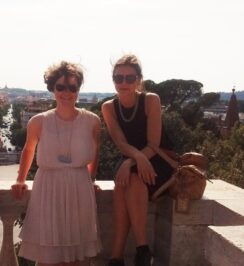
I have fond memories of my participation in the 2015 Winter School. The impressive venues (on the famous Via Omero with its national academies including the Academia Belgica), the excellent company (picture on the left), the eternal city (ah, Rome!). In academic terms, I was an infant then, having started my PhD training only a few months earlier. The Winter School is where I gave my first ever research presentation. I remember being nervous, and having learned my presentation entirely by heart. I still experience a certain amount of nerves when giving presentations – but, I no longer brave to give them entirely from memory. Is that a pity? Looking back today, I realize that, although I had a lot to learn, not least about my topic and research in general, I should probably also take inspiration from my old, younger self. Should we not continue to cherish some of the qualities that the former versions of us, more naïve perhaps, possessed, but which have been dulled somehow by years and experience?
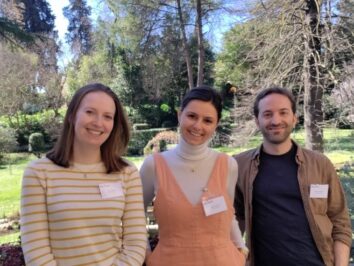
But so much for this trip down memory lane – fast forward again to 2023. The Winter School’s location and theme did not only facilitate personal reflections on an individual’s journey through life but also serious academic work. Our week in Rome was devoted to discussing the ways in which change was introduced, acknowledged, and handled in Greco-Roman and late antique society (and beyond), the tension between the ‘old’ and the ‘new’, and the various mechanisms, agents, and motivators of continuity and change in textual and material culture. All of these issues were approached within an interdisciplinary framework. The success of these discussions was first and foremost a result of the fact that the overall quality and coherence of the papers presented by the PhD students was utterly commendable. In addition, three expert scholars from various disciplines (archaeology, linguistics, and literature) gave inspiring keynote lectures that offered in-depth knowledge and advanced methodologies to conceptualize tradition and innovation in the ancient world and today. The programme also comprised two excursions. During both, the group was in the excellent hands of archaeologist Alice Poletto (BSR, Rome), who guided the visits to various monuments, in the city and at the archaeological site of Ostia Antica, which embody historical transformation and the tension between old and new. Finally, an original element was added to the classic format of the Winter School in the form of a workshop on conference and presentation skills for Phd students.
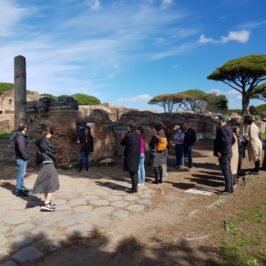
Together, the various lectures, presentations, and excursions, both stimulating and refreshing, but also the workshop, lunches and group dinner, in the company of good colleagues and friends, made for a most delightful programme. It counts as a bonus that, without having to travel much, we were able to enjoy a small ‘tour of Europe’ during the various days spent at the Academia Belgica, the Royal Netherlands Institute (KNIR), and the Swedish Institute in Rome, all conveniently located on the Via Omero 8, 12 and 14, respectively. We are grateful to all three institutes for the warm welcome we received. Above all, it was most enjoyable to see that the participating PhD students got on so well, and that they were so passionate, not only about their own research, but about engaging with and learning from that of others as well. As the entire event presented an undeniable flashback to my own early days as a PhD student some eight years ago, this ‘next generation’ embodied the continuous flow of time, while bringing before my eyes the ‘younger selves’ from whom I felt we should do well to take inspiration. Fittingly, the scholarly discussions about things old and new, and about the ways in which communities have historically dealt with change and the passing of time, seemed to suggest precisely that humans, individually and collectively, go through cycles of adherence to tradition and radical innovation, of deaths and rebirths, of optimism and pessimism, of isms- and post-isms, over and over again. Must history repeat itself, then? Never, I believe, in the exact same way. To that end, it is only paramount that we maintain an active and involved relation with the past, with future generations and with our own, personal journeys.[v]
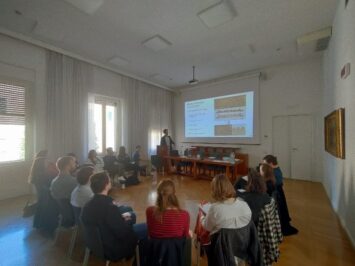
[i] Warm thanks to Dimitri for the smooth and enjoyable collaboration.
[ii] Participating universities in this year’s AWWS other than Ghent University: the Universities of Groningen, Göttingen, Uppsala and Tartu. In 2018, the original U4 network (Ghent, Groningen, Göttingen, Uppsala) was expanded by the entry of the University of Tartu and became the ‘U4 Society’. In 2020, the U4 Society was absorbed by the ENLIGHT structure, with four extra partner universities.
[iii] The identity of my mysterious but trustworthy source can be revealed here: prof. Danny Praet (Department of Philosophy, Ghent University), who was closely involved with the organization of the Winter School since its first beginnings until recent years. The first edition was held from 1-5 February 2010 in Athens, with the theme ‘Identity and Cultural Transfer in Antiquity’. Since then, the Winter School has rotated between Athens, Rome, Istanbul, Palermo, and Naples.
[iv] The Department of Literary Studies (the Latin and Greek sections), the Department of Linguistics (the Latin and Greek sections), the Department of History, the Department of Archaeology, and the Department of Philosophy and Moral Sciences.
[v] I am grateful to the Ghent University Doctoral Schools and ENLIGHT, whose generous funding have made the 2023 edition of the Ancient World Winter School possible.